Introduction
When we think about political leaders who left a lasting impression, we often picture individuals who combined passion with service. One such figure is Richard Holland, a respected politician whose career was marked by integrity, leadership, and a deep commitment to his community. His story is not just about politics but about perseverance, family values, and creating a legacy that continues to inspire.
Early Life and Education
Richard Holland’s journey began in America, where he grew up with a strong sense of responsibility and civic duty. From a young age, he was known for his curiosity, leadership abilities, and a desire to contribute positively to society.
He pursued higher education with the goal of developing the knowledge and skills necessary for a career in service. His academic path equipped him with the tools to engage in politics, lawmaking, and leadership—a foundation that would later define his contributions as a state senator.
Entry into Politics
Holland’s entry into politics was driven by a strong sense of purpose. He understood that real change often comes from those willing to step up and lead. His early political career was characterized by grassroots involvement, connecting with local communities, and advocating for policies that reflected the values of his constituents.
By running for office, Holland showed his commitment to representing everyday people—workers, families, and small business owners—whose voices were sometimes overlooked in the political landscape.
Career as a State Senator
As a state senator, Richard Holland distinguished himself with his ability to listen, analyze, and take action. He served with dedication, ensuring that the needs of his district were prioritized.
Key highlights of his political career included:
- Advocating for education reforms to improve schools and provide better opportunities for children.
- Supporting healthcare initiatives that increased access for underserved populations.
- Championing infrastructure development, ensuring roads, public spaces, and services met modern demands.
- Promoting economic growth, especially by supporting small businesses and local entrepreneurs.
Colleagues often praised him for being approachable, pragmatic, and solutions-focused. Rather than partisan bickering, Holland sought collaboration—bridging divides and putting people above politics.
Community Involvement
Outside the legislature, Richard Holland was equally committed to his community. He believed in the power of civic engagement and spent much of his free time working with local organizations, charities, and educational institutions.
He supported youth mentorship programs, volunteer initiatives, and community-building projects that encouraged people to come together for a common good. To Holland, being a politician was not just about passing laws but about being present in people’s lives.
Leadership Style
What set Holland apart was his leadership style. He led not through authority but through empathy, integrity, and vision. His constituents trusted him because he took the time to understand their concerns and worked tirelessly to address them.
Colleagues often described him as a consensus-builder—someone who could mediate differences and find common ground. This style made him both effective in politics and deeply respected as a person.
Personal Life and Values
Richard Holland was not only a public figure but also a family man. He valued the importance of balancing public duties with personal commitments. His family often spoke about his dedication to them, even while managing the heavy responsibilities of political life.
He carried values of humility, honesty, and service into every aspect of his life, inspiring both those who knew him personally and those who admired him from afar.
Legacy and Impact
The legacy of Richard Holland lives on in multiple ways:
- The laws and policies he helped shape continue to benefit communities.
- His example of ethical leadership sets a standard for future politicians.
- His community involvement left a mark on organizations, charities, and educational programs that still thrive today.
For younger generations, his career is a reminder that politics, at its core, is about serving people, not personal gain.
Why Richard Holland’s Story Matters
In today’s political climate, stories like Richard Holland’s are important. They remind us that leaders can—and should—be principled, compassionate, and community-driven. His career proves that politics is not only about power but also about making a difference in the lives of ordinary citizens.
His life offers lessons in perseverance, service, and integrity—qualities that are as relevant today as they were during his career.
Conclusion
Richard Holland’s journey is more than just the biography of a politician—it’s the story of a man dedicated to improving the lives of others. From his early days shaped by family and education, to his impactful career as a state senator, and his ongoing legacy of community service, Holland represents the very best of public service.
As we reflect on his contributions, one thing is clear: Richard Holland’s life and career remind us that leadership, at its core, is about service, humility, and a vision for a better future.





[…] because they shine a light on what it means to live with passion, purpose, and resilience. Taylor Gilmore’s story is one of those. Whether you’ve recently come across her name or have been following […]